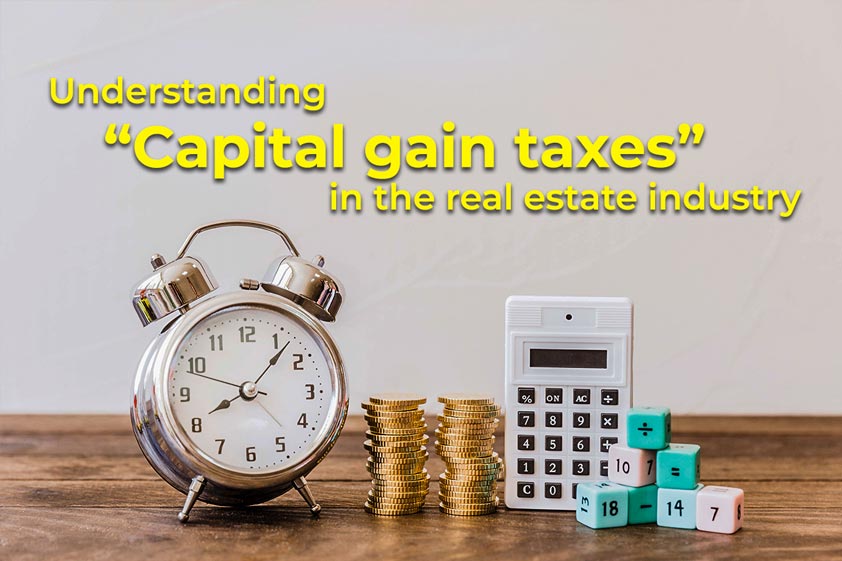Understanding “Capital gain taxes” in the real estate industry

What is Capital gain tax?
Capital gain tax points to the gain or profit that is acquired from the selling of a capital asset (Properties such as homes, cars, investment properties, stocks, etc.) Falling under the category of ‘income’, this particular gain or profit makes the sellers obliged to pay a stipulated amount as tax in the same year the transfer of the asset occurs.
Capital gain taxes are of two kinds: short-term and long-term capital gain taxes and they are not applicable to inherited properties as there is no actual “sale” taking place and it is perceived only as a transfer in ownership. However, if an individual who has inherited the asset is selling it, the capital gain tax will be applicable.
Capital gain taxes are exempted in some nations such as Sri Lanka, Singapore, New Zealand, etc. In the countries they are imposed, rates of taxation vary for individuals and businesses.
How to calculate capital gains in real estate?
The calculation of capital gains will alter in accord with the time period the asset has been held. Apart from that, some of the essential aspects one should have knowledge about while calculating the capital gains are for a property are:
- Cost of improvement
Expenses incurred as part of the additions or alterations made to the property.
- Acquisition cost
The amount that the seller has paid for obtaining the particular property
- Full value consideration
The amount that the seller acquires after the transfer of the property. The calculation varies for long-term and short-term capital gains and let’s have a look at it:
Calculating Long Term Capital Gains
For evaluating the long term capital gains of a property, the seller must:
- Consider the full value asset
- Make the deductions such as:
a) Transfer costs
b) Acquisition cost
c) Cost of improvement
From the figure that has been obtained following the above calculation, the individual should deduct any exemptions that are provided under sections 54 B, F, and EC of the Indian Income Tax Act, 1961.
Calculating Short Term Capital Gains
In order to evaluate the short term capital gains of a property, the seller must:
- Consider the full value asset
- Make the deductions such as:
a) Transfer costs
b) Acquisition cost
c) Cost of improvement
Deducting the transfer cost + acquisition cost + cost of improvement from the full value asset gives you the short-term capital gain.
3 ways to save on Capital Gains Tax while selling a property
- Exemptions under section 54F
If you are an individual, trying to sell your old house as a means to pay for your new one, you are exempted from capital gains tax under section 54F of the Indian Income Tax Act, 1961; provided you meet the following conditions:
a) Purchasing a new house within one year before the selling of your old one
b) Constructing a new house within 3 years after selling your old one
c) The landlord does not put the house for sale within 3 years of the purchase or construction.
d) The newly constructed or purchased house is located within the country
e) You should not own more than 1 house (excluding the new one) while you are selling the old one.
- Invest in Bonds
Investing in specified financial assets is another way that helps you save on your hard-earned capital gains as long-term capital gains are exempted under section 53EC of the Indian Income Tax Act, 1961.
However, to avail of this exemption, you would be required to invest the sum earned in bonds within 6 months of the transfer of the sum and realization of the gains. Moreover, there is a lock-in period (minimum of 3 years) for the invested funds.
- Invest in CGAS (Capital Gains Account Scheme)
Investing in Capital Gains Account Scheme (CGAS) is another method to save on capital gains tax in real estate. Providing great relief to taxpayers, this is the perfect means for buyers who cannot invest in a brand-new property before their income tax return filing.
CGAS scheme accepts investments for three years and during this period you can utilize the capital gains for the purchase or construction of a new property. CGAS accounts can be opened in any of the designated banks authorized by the government of India.
Ready-to-occupy flats in Kochi can help you gain tax benefits than under-construction apartments or newly launched projects. Veegaland Homes’s flats and apartments in Kochi are designed and developed to realize your modern living aspirations.
To learn more about our apartments in Kochi, please visit: https://www.veegaland.com/
Recent Blog

Location Matters: Finding the Ideal Neighborhood for Your Apartment
Location is undoubtedly the most important factor when searching for an apartment. The safety and homely feeling of the neighborhood is what plays a key role in offering the peace of mind and sense of security you a... Read More

Apartment Amenities: Must-Haves to Look for When Buying
Be it as your first home, an investment, or an attempt to downsize - buying an apartment is a significant milestone for most of us. However, choosing the right apartment involves careful consideration of numerous fa... Read More

Transform your apartment balcony into a serene retreat
An apartment with a small or large balcony is an absolute necessity for today’s aspiring homebuyers. However, simply maintaining it the way that it was handed over doesn’t do justice to the potential of that spa... Read More

Your Gateway to Luxury Living in Kochi: Veegaland Green Heights
“Magnum Opus” is a term widely used in the universal literary, arts and academic contexts. It simply denotes a great value to a particular work of an individual - that is considered as the greatest work of... Read More

